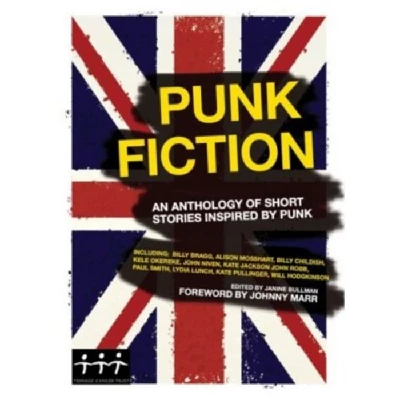Miscellaneous
-
Punk Fiction
published: 19 /
4 /
2009

Mark Rowland examines 'Punk Fiction', a charity collection of short stories, in which assorted writers including Nicholas Hogg, Martin Lloyd Edwards,John Niven, Kate Jackson, Billy Bragg and Billy Childish write short stories based on punk rock songs
Article
'Punk Fiction' is a collection of short stories compiled by music PR Janine Bullman, in aid of the Teenage Cancer Trust, in which assorted writers write short stories based on punk rock songs.
The contributors are a mixed bag of authors, poets, journalists and musicians, each with their own take on the stories – some in a contemporary setting, others in the punk era, others in indiscriminate times and places.
As with most compilations of short stories, especially those based on songs, punk fiction is a mixed bag, but there are enough that hits home to make it worthwhile, particularly as it’s for a good cause.
The first story, by author Nicholas Hogg, starts things off well – a tale of late 70s suburban childhood that is vaguely reminiscent of Shane Meadows’ film 'This is England'. Joolz Denby’s following story, based around the 'Ruts’ West One (Shine on Me)', could not be more different, a short piece about what the Ruts meant to the main protagonist in the story.
John Niven’s 'Cattle and Cane' and Martin Lloyd Edwards’ 'Oliver’s Army' are early highlights of the book, the latter in particular setting a very tense and atmospheric scene before subverting expectations at the end.
Lane Ashfeldt’s 'California Uber Alles' stands out for its bold use of the second person, and the bleak picture it portrays of life on the streets of Berlin. Guardian music journalist Laura Barton captures a childish naivety in Time’s Up, about a teenage boy waiting for his girlfriend to get ready for a gig.
The musicians who have contributed have perhaps more to prove with their forays into fiction writing, but in many cases, they are surprisingly good. Kele Okereke of Bloc Party’s snapshot of a straight-laced guy who turns to shoplifting is well written and captures a mood nicely, while Kate Jackson of the Long Blondes weaves multiple narratives into her few pages of text. Lydia Lunch’s 'Shot By Both Sides' is as you’d expect it to be – almost poetic prose, full of bold and not entirely pleasant imagery.
The weakness in some of the stories lies not in the strength of the writing, which is all very good, but with the stories themselves. As expected from an objective that is limited to the inspirations derived from one song, some of the stories fall into cliché, failing to connect in quite the same way as the others.
The two stories that capture the spirit of punk most succinctly are the final two, by Billys Bragg and Childish respectively. Both survivors of the original punk scene, their efforts are inflected with the nonchalant sneer of punk, there is more than a hint of nostalgia to Bragg’s story. Billy Childish’s story is perhaps better, his distinctive voice bringing the right amount of sneer and humour, all written in his dyslexic prose, which he (quite rightly) refuses to have corrected. His summation of punk in his second paragraph is spot on.